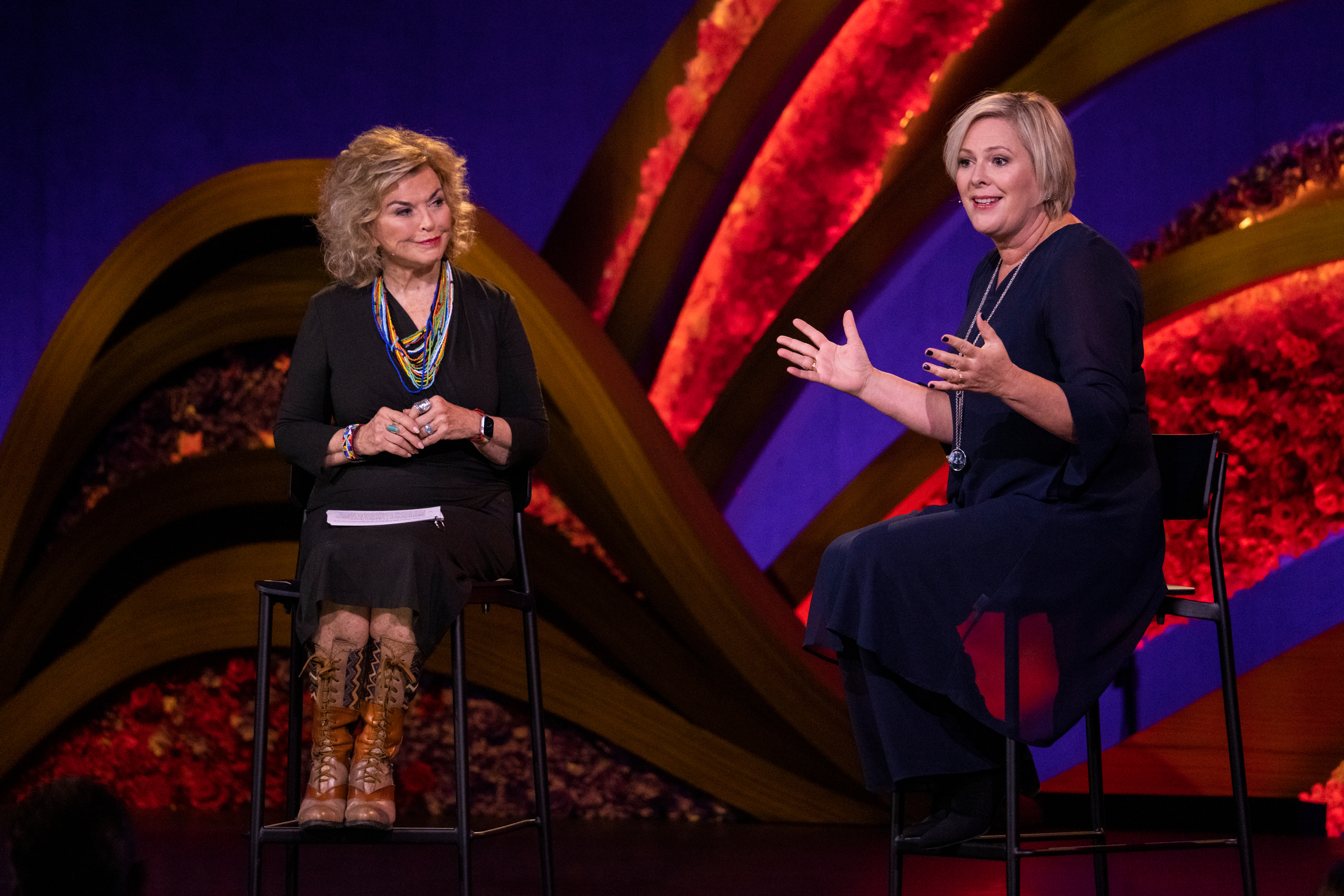
Change catalyst Halla Tómasdóttir urges each of us to use our vote, wallet and voice to act on climate change. She speaks with TEDWomen curator Pat Mitchell at TEDWomen 2021: What Now? on December 2, 2021 in Palm Springs, California. (Photo: Gilberto Tadday / TED)
If we’re going to continue to live, breathe and thrive together on this planet, we’re going to have to answer a couple of very important questions: What now for the Earth? And how do we balance the urgency of the climate crisis while still dreaming of a bright future? With actions and answers, six incredible speakers joined Session 4 of TEDWomen 2021, sparking hope, innovating solutions and uplifting humanity.
The event: TEDWomen 2021: Session 4, hosted by TEDWomen curator Pat Mitchell, in Palm Springs, California on December 2, 2021
Speakers: Halla Tómasdóttir, Resson Kantai Duff, Sonali Prasad, Ndidi Okonkwo Nwuneli, Ozawa Bineshi Albert and Katie Paterson
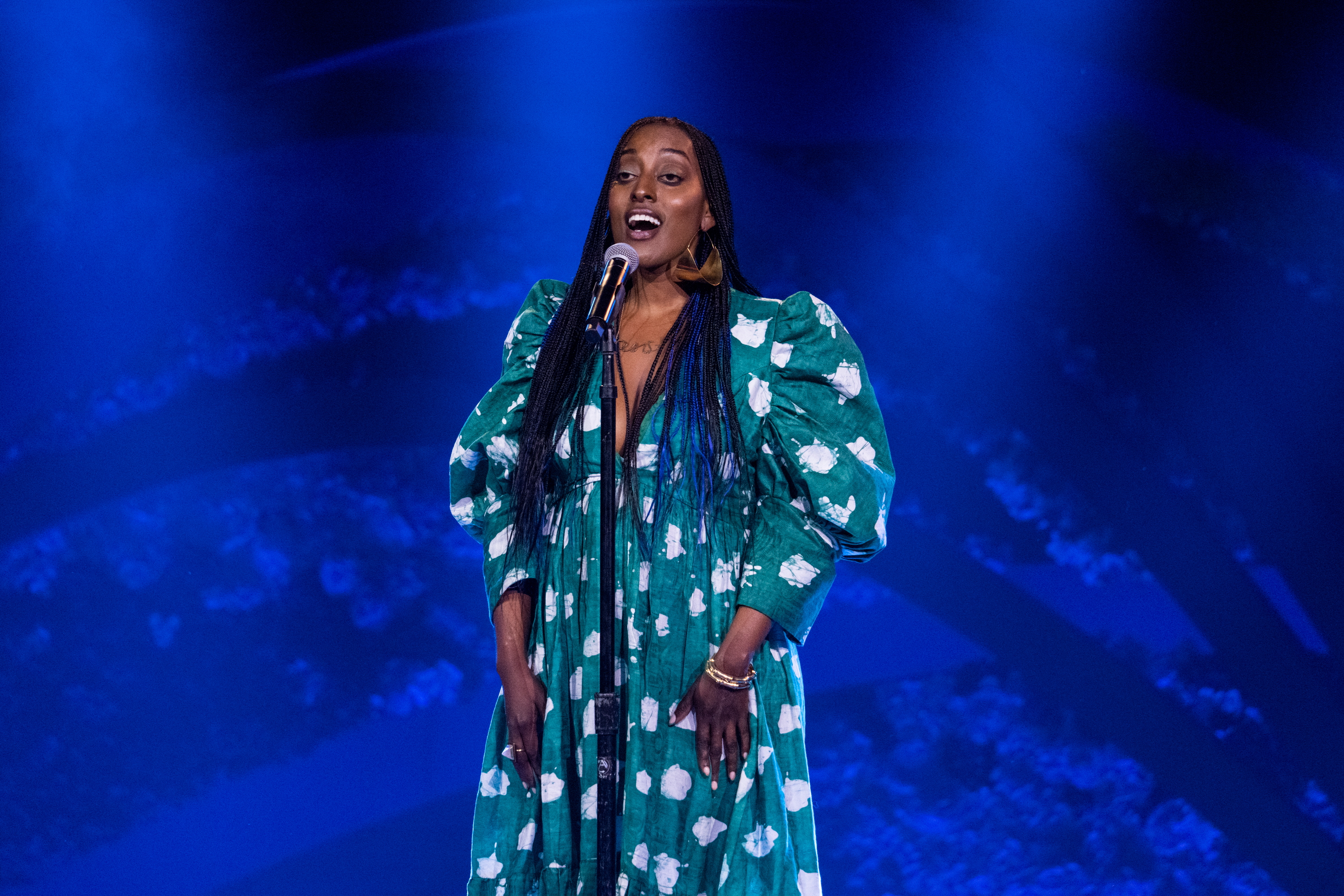
TEDWomen 2021 music curator and multidisciplinary artist Niama Safia Sandy sings Donny Hathaway’s “Someday We’ll All Be Free” at TEDWomen 2021: What Now? on December 2, 2021 in Palm Springs, California. (Photo: Gilberto Tadday / TED)
Music: Music curator of TEDWomen and multidisciplinary artist Niama Safia Sandy kicks off the session with a chilling rendition of “Someday We’ll All Be Free” by Donny Hathaway. Powerful vocals and breathtaking lyrics fill the room as Sandy invites the TEDWomen audience to join her in singing.
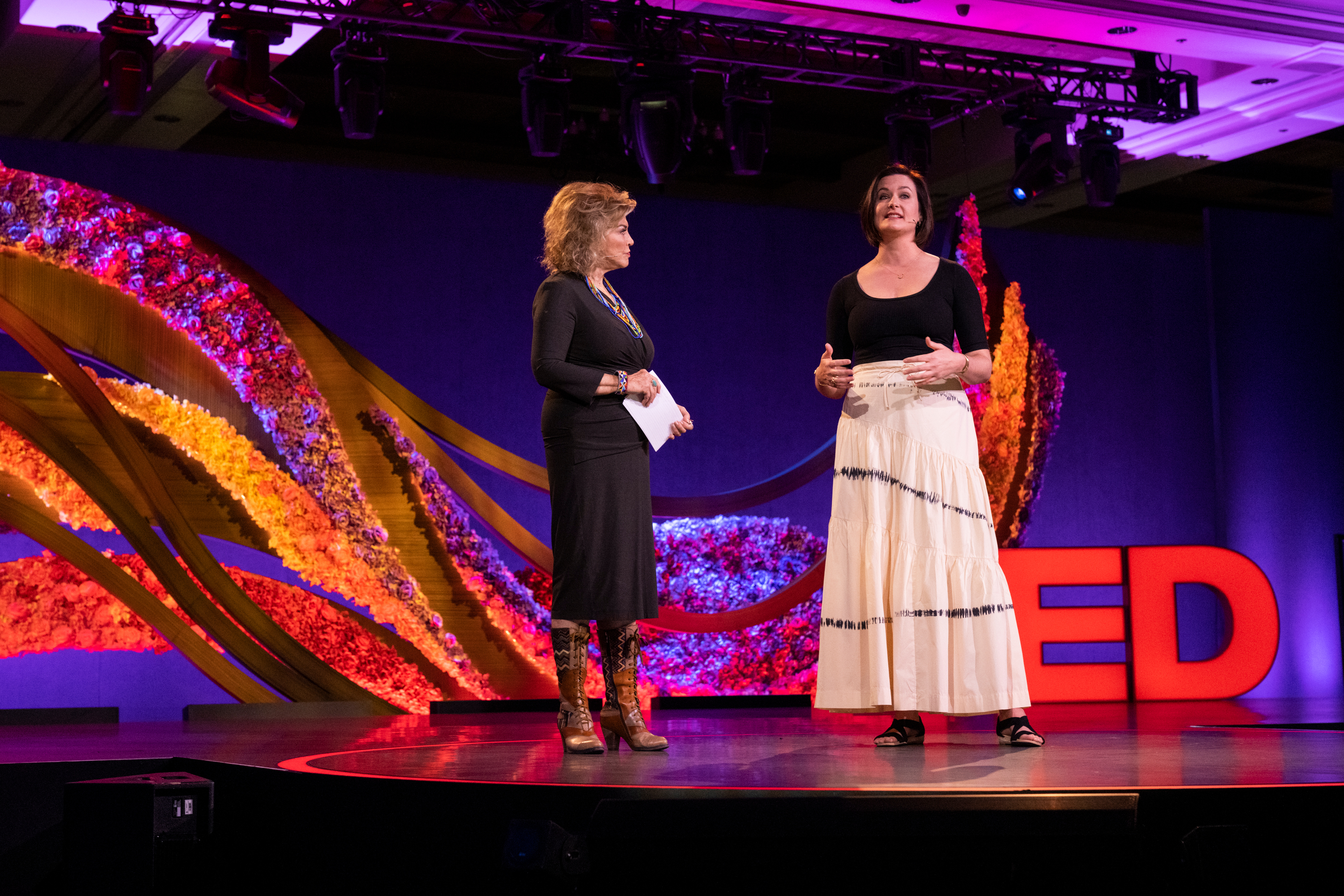
Writer and environmentalist Katharine Wilkinson shares updates on her 2018 TED Talk with TEDWomen curator Pat Mitchell at TEDWomen 2021: What Now? on December 2, 2021 in Palm Springs, California. (Photo: Stacie McChesney / TED)
Special guest: Writer and environmentalist Katharine Wilkinson gives an update on her 2018 TED Talk, where she spoke about empowering women and girls to help stop global warming. In conversation with Pat Mitchell, Wilkinson shares a crucial truth: that the predatory forces keeping transformation at bay still exist yet collective courage is growing, reflected in the surge of youth climate action, Indigenous land defense and actions of frontline communities. Wilkinson also talks about her 2020 book, All We Can Save, that she edited with marine biologist and policy expert Ayana Elizabeth Johnson, which is an anthology of poetry, essays and art from those leading in climate action.
The talks in brief:
Halla Tómasdóttir, change catalyst in conversation with TEDWomen curator Pat Mitchell
Big idea: Use your vote, your wallet and your voice to act on climate.
How? Halla Tómasdóttir — CEO of the B Team, former presidential candidate of Iceland and longtime friend of TEDWomen — is recently back from the COP26 climate conference in Glasgow. She explains that while the generational trust gap on climate is widening, there are some things to be hopeful about coming out of the gathering. First, the climate agenda is becoming more holistic — we’re talking about nature, justice and inclusion now — not just greenhouse gasses. Next, this was the COP where business and finance really showed up, knowing that governments can’t solve the crisis on their own. She also saw some unlikely alliances form, notably between business leaders and the Global South, resulting in massive monetary commitments. And finally, she saw accountants become unlikely change catalysts with the creation of the International Sustainability Standards Board, which aims to change everything about the norms of business. “The most difficult work of our lifetimes has to happen in the next few years,” says Tómasdóttir. She asks us all to not underestimate our power, especially as collectives of employees — and to mobilize and put pressure on CEOs and politicians to act.
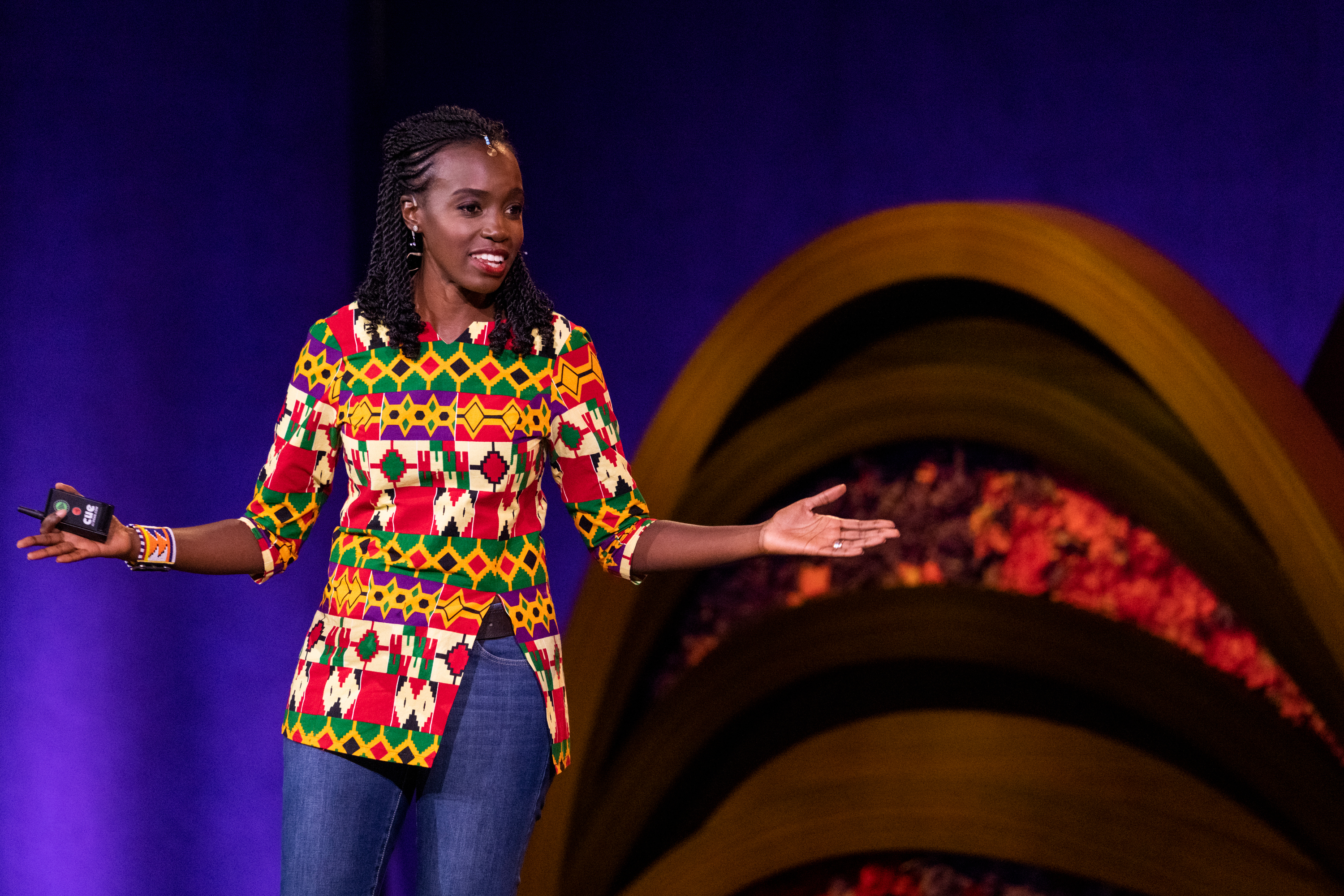
Conservationist Resson Kantai Duff speaks about empowering local communities to protect African wildlife at TEDWomen 2021: What Now? on December 2, 2021 in Palm Springs, California. (Photo: Gilberto Tadday / TED)
Resson Kantai Duff, conservationist
Big idea: Typically, conservation efforts in Africa have been led by “parachute” conservationists — outsider superheroes who drop in with all the answers, hire locals to implement them and then disappear. Instead, Africans should lead the way in saving wildlife, using their own knowledge and strategies.
Why? The world has lost 68 percent of its wildlife in the last 50 years, says Resson Kantai Duff. This shocking statistic demands new solutions — and they need to be implemented by the people on the frontlines. Too often, Africans have been seen as barriers to conservation, painted as poachers, squatters and encroachers rather than as the stewards of wildlife that they have been for generations, she says. But tribes like the Samburu of Kenya, who have tracked and hunted lions for generations, are their logical stewards. They are the instigators of programs like Warrior Watch, where hunters shadow lion prides not to kill them but to warn other herders away. Most importantly, Resson believes that women must be more than merely involved — as traditional guardians of wildlife, they must spearhead conservation efforts.
Sonali Prasad, TED Fellow, writer, artist
Big idea: Disaster can strike at any moment, but stories can teach us how to cope with life-changing events we can’t predict and navigate unexpected ruptures in our lives.
How? Sonali Prasad unearths the stories buried in disasters. She says that after a rupture like a weather catastrophe or the recent pandemic, the stories we tell take one of two shapes: they are either hideous or hopeful. In a talk that blurs poetry with narrative storytelling, Prasad returns to the Aceh province in India, an area ravaged by the 2004 tsunami, and speaks to the strangeness that follows a disaster. She recounts the grief and struggle she witnessed among the tsunami’s survivors alongside accounts of fortitude, imagination and hope. Why must we revisit sites of such devastation? she asks. “Because in their dust lies the possibilities for navigation of the fog of ecological disruption.”
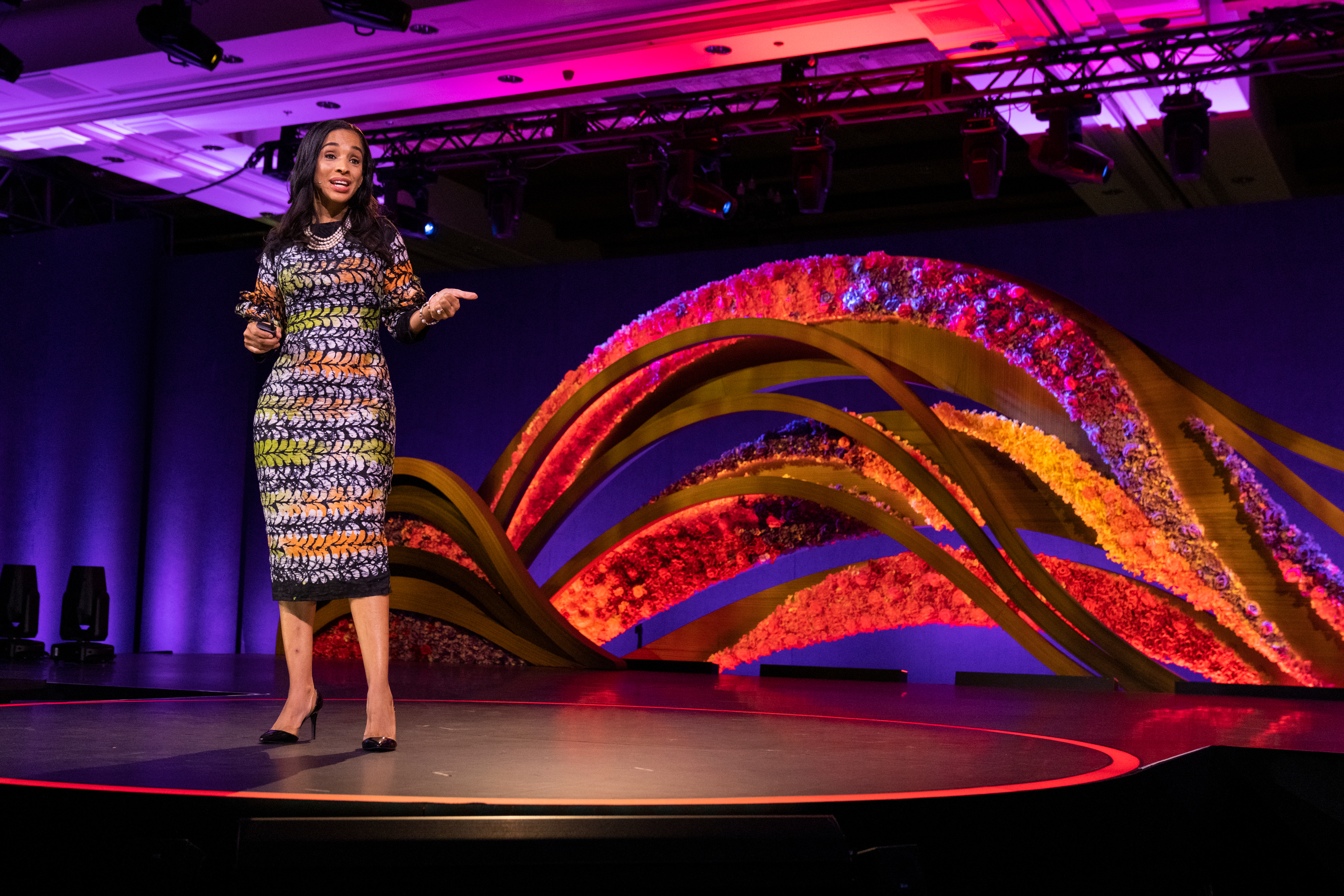
Social entrepreneur and innovator Ndidi Okonkwo Nwuneli talks about fixing our broken food system at TEDWomen 2021: What Now? on December 2, 2021 in Palm Springs, California. (Photo: Gilberto Tadday / TED)
Ndidi Okonkwo Nwuneli, social entrepreneur and innovator
Big idea: We can create a more affordable, sustainable and just food system by changing how we grow, produce and distribute food.
How? As a social entrepreneur focused on global agriculture, Ndidi Okonkwo Nwuneli examines the true cost of food. She reports that our current food system is value-destroying — meaning it harms human health, our planet’s climate and the economic viability of small to medium-scale food enterprises. But we can take steps to fix it. First, we must make sure that healthy food is accessible to everyone, especially people from lower-income communities. A healthy diet, one low in processed food and high in fresh produce, supports positive health outcomes which can lower hospitalization rates and medical costs. Next, we have to reduce greenhouse gas emissions from food waste and shorten our supply chains, so that food doesn’t travel so far from farm to mouth. And last, we need to support entrepreneurs with sustainable food practices, from farmers to seed entrepreneurs, logistics providers and even cooks. Small- and medium-scale enterprises like these create jobs in their communities and make nutritious food more widely available. So the next time you sit down to eat, Nwuneli encourages all of us to think about our food choices and consider the power we wield with our plates.
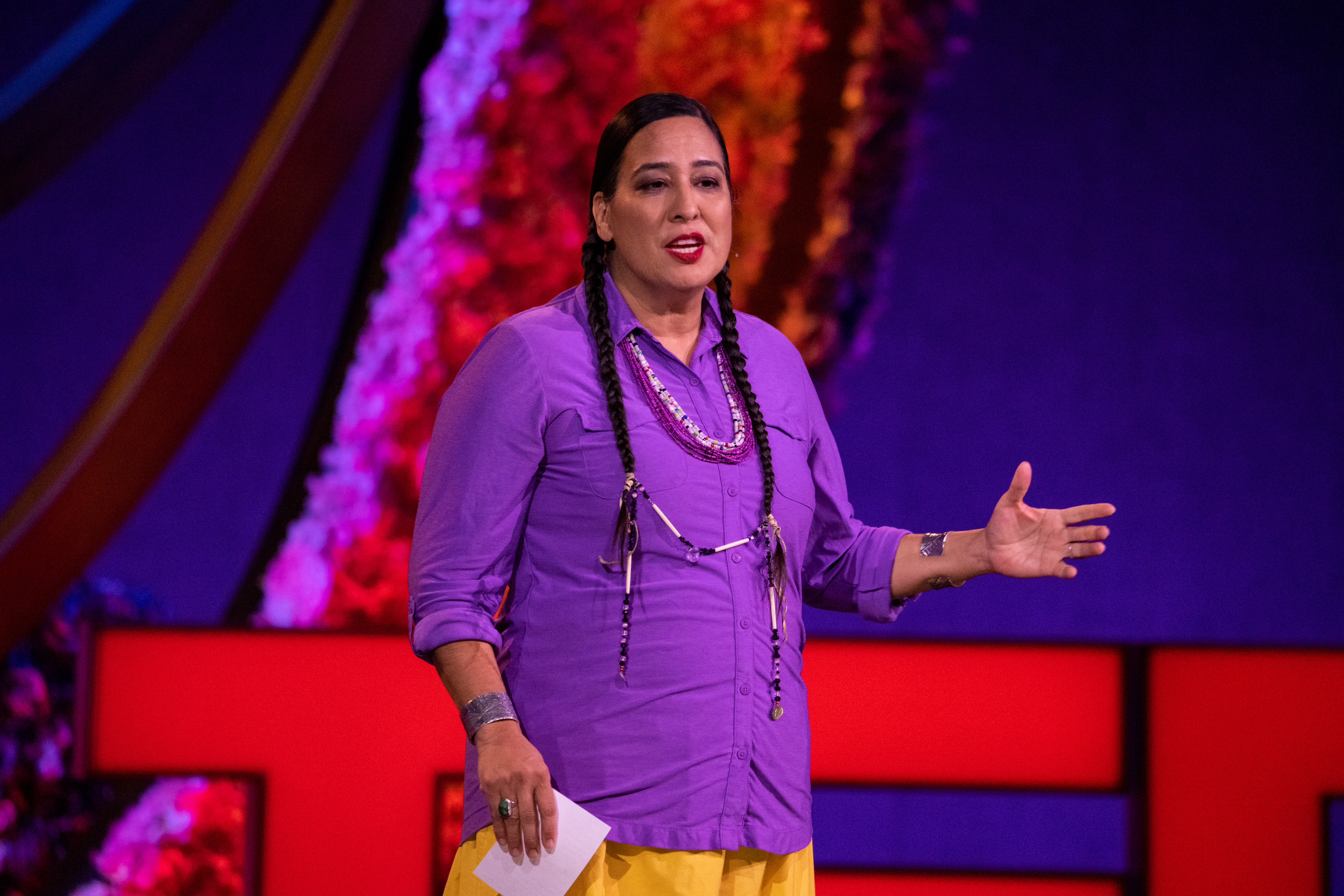
“We can’t rely on those who created the problem to fix it,” says Ozawa Bineshi Albert as she talks about climate change solutions at Session 4 of TEDWomen 2021: What Now? on December 2, 2021, in Palm Springs, California. (Photo: Stacie McChesney / TED)
Ozawa Bineshi Albert, climate justice organizer
Big idea: When it comes to climate change, we need a drastic shift in leadership.
Why? To date, the majority of viable climate solutions have been crafted and defined by corporations, governments and some scientists, says Ozawa Bineshi Albert. Much of this effort has been seen through the lens of the economy, ensuring the survival of capitalism within climate change rather than the survival of humanity and the planet. That’s why Albert is calling for a full-throated change in leadership, one that centers the wisdom and solutions of those communities most impacted by the climate crisis. People on the frontlines are the actual experts, Albert says: they’ve directly experienced climate disasters for decades and have a deep sense of the urgency of the crisis. With these people at the helm, we could shift focus away from net-zero emissions (a type of “masquerade” for corporate inaction or participation in a few offset programs, Albert says, while they still dump waste into local communities) and instead begin to cut off toxic pollution at the source. “We can’t rely on those who created the problem to fix it,” Albert says. But if we change two things — our sense of urgency and the people leading the solutions — the planet, and everybody on it, will benefit.
Katie Paterson, conceptual artist
Big idea: Conceptual artwork can help situate human beings in our cosmic timeline and bring distant, primordial landscapes closer to our lives.
How? Short-sightedness may be the greatest threat to humanity, says Katie Paterson. As a conceptual artist, her work engages the concept of deep time: the Earth’s history over millions of years. Her projects include a telephone line connected to a melting glacier, a map of every dead star in our universe and a necklace whose beads are carved from ancient fossils and strung in geological order, epoch by epoch. Whatever the medium, Paterson uses artwork to expand our human sense of scale. She calls her Future Library project a century-long prayer. Every year for the next 100 years, a different author will submit an unread manuscript to the Future Library. In 2114, the library will publish these manuscripts on paper made from a forest of 1,000 spruce trees that Paterson and her team planted on the outskirts of Oslo in 2014. Although 100 years isn’t vast on a cosmic scale, the project reminds us of our invisible ties to future generations. “To be human,” Paterson says, “is to understand that we are part of a long continuum.”